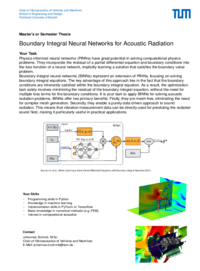Boundary Integral Neural Networks for Acoustic Radiation Problems
- Institut
- Lehrstuhl für Akustik mobiler Systeme
- Typ
- Semesterarbeit Masterarbeit
- Inhalt
- theoretisch
- Beschreibung
Your Task:
Physics-informed neural networks (PINNs) have great potential in solving computational physics problems. They incorporate the residual of a partial differential equation and boundary conditions into the loss function of a neural network, implicitly learning a solution that satisfies the boundary value problem.
Boundary integral neural networks (BINNs) represent an extension of PINNs, focusing on solving boundary integral equations. The key advantage of this approach lies in the fact that the boundary conditions are inherently satisfied within the boundary integral equation. As a result, the optimization task solely involves minimizing the residual of the boundary integral equation, without the need for multiple loss terms for the boundary conditions.
It is your task to apply BINNs for solving acoustic radiation problems. BINNs offer two primary benefits: Firstly, they are mesh-free, eliminating the need for complex mesh generation. Secondly, they enable a purely data-driven approach to sound radiation. This means that vibration measurement data can be directly used for predicting the radiated sound field, making it particularly useful in practical applications.Contact:
Johannes Schmid, M.Sc.
Chair of Vibroacoustics of Vehicles and Machines
E-Mail: johannes.d.schmid@tum.de- Voraussetzungen
Your Skills:
- Programming skills in Python
- Knowledge in machine learning
- Implementation skills in PyTorch or Tensorflow
- Basic knowledge in numerical methods (e.g. FEM)
- Interest in computational acoustics
German or English possible.
- Möglicher Beginn
- sofort
- Kontakt
-
Johannes Schmid, M.Sc.
Raum: MW1536
Tel.: +49 (89) 289 - 55145
johannes.d.schmidtum.de - Ausschreibung
-
